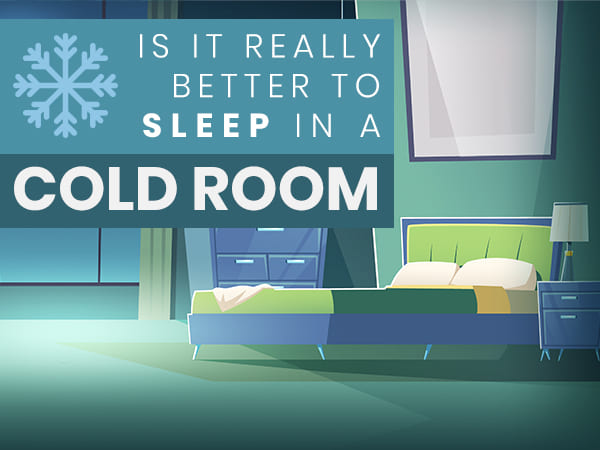

: Admin : 2020-05-16
Everybody knows that sleep is a critical part of our health and study proves it. But do you know that the place and environment where you sleep plays an important role in defining the quality of your sleep?
According to many studies, sleeping in a cold room is better for your health than sleeping in a warm room. Although sleeping in a cold room may not be a healthy option, health experts point out that it facilitates sleep and helps the body lose weight in the process.
Some Benefits Of Sleeping In A Cold Room
Sleeping in cold temperatures has many benefits, it can help reduce the risk of metabolic disease, which improves sleep quality. It should also be noted that sleep usually starts when our body temperature drops so sleeping in a cold room can encourage us to sleep faster.
Promotes quick sleep: According to studies, your body starts dropping in temperature before sleeping as a way to conserve your energy. Sleeping in a cold room helps you drop your body temperature in a healthy way, so it helps you fall asleep quickly.
Which Is The Best Time To Sleep And Wakeup?
Improves sleep quality: A cooler room helps to regulate your body temperature throughout the night, thus improves your sleep quality. When your body cools down naturally, you get into a deeper sleep, this allows you to wake up feeling refreshed and well-rested.
Improves metabolism: There are different types of fats in the human body which are usually identified by different colours. White fat is unhealthy fat which is often associated with diseases like type 2 diabetes but brown fat helps improve insulin sensitivity and regulate the temperature in your body. So when you sleep in a cold room your body will naturally develop more brown fat which will burn to keep you warm, increasing your metabolism naturally.
Prevents insomnia: Many studies have shown that people who suffer from insomnia try to keep their body temperature warm before sleeping. Therefore, by having a cooler room, your body will feel comfortable and calm, due to which your brain will indicate that it is time to sleep.
Increase melatonin levels: A person's body naturally begins to produce more melatonin as that person cools down the environment with the effects of their circadian rhythm and naturally helps that person to produce more melatonin.
Reduces stress: If you sleep in a cold room, your stress levels may decrease and your mood can be good. It is during your deep sleep state that your brain, calming your mind, and sleeping in a cold room can help make this process easier of production of melatonin and serotonin play an important role here.
Does Hot Temperature Affect Your Sleep?
The temperature of your sleeping place and your level of comfort affect how well and how long you sleep. Whenever you go to sleep, the set point of your body temperature goes down. This is the temperature that your brain is trying to achieve. But if the room is too hot or too cold then it will be difficult for your body to match this set point.
Best Temperature For Sleeping?
No specific temperature really applies to everyone. Experts claim that what is comfortable for one person is not necessarily comfortable for the other. However a close specific recommendation would be to keep the room between 19 ° C to 22 ° C. Also, it is always best to set the temperature at a comfortable level of the sleeper.
Hours Of Sleep You Really Do Need
The quality of your sleep directly affects your mental, physical health and the quality of your waking life, including your productivity, emotional balance, health, weight, etc. According to the National Sleep Foundation, the appropriate sleep duration for specific age groups should be as follows:
For Newborns Babies (0 to 3 months): 14 to 17 hours each day
Infants (4 to 11 months): 12 to 15 hours
Toddlers (1 to 2 years): 11 to 14 hours
Preschoolers (3 to 5 years): 10 to 13 hours
School-age children (6 to 13 years): 9 to 11 hours
Teenagers (14 to 17 years): 8 to 10 hours
Adults (18 to 64 years): 7 to 9 hours
Older adults (over 65 years): 7 to 8 hours
Tips For Good Sleep
According to the Centers for Disease Control and Prevention, the following suggestions may be considered for some good sleep:
How To Cool Down Your Room Without An AC
When it is thought to reduce the room temperature, the first thought that comes to mind is that of AC. In addition to carbon emissions produced from excessive use of AC, dry eyes, headaches, respiratory problems and dry skin etc. can occur.
So here is a list of ways that you can cool your room without AC:
Conclusion
Nowadays it is the summer season so it is important that you reduce the temperature in your room. Sleeping in a cold room does not at all mean that you have to freeze yourself, because excessive cooling in the morning can never be good for your throat, it can cause you a cold and sneeze. In addition, each person's sleep requirements differ from another. Therefore, according to health experts and studies, it is necessary for adults to get 6 to 9 hours of sleep every night to avoid the onset of various health problems.
meddco sleeping health health sleeping Cold Room body temperature Prevents insomnia Reduces stress
No Comments